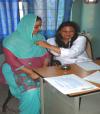Irregular Bleeding, Bleeding After Protected Intercourse, Light Bleeding Daily

Question: irregular bleeding, and a pad full of blood after protected intercourse . and light blood everyday since.
Hello,
Thanks for the query.
Irregular bleeding is called dysfunctional uterine bleeding.
The causes can be many like hormonal imbalance, progesterone deficiency , ovarian factors , general factors like anaemia , hypothyroidism , stress etc.
Contact bleeding indicates cervical pathology for which you should get your pap's smear done.
Haemoglobin , ultrasound , serum progesterone levels are required to reach a diagnosis.
You can start with duphastan or progesterone under your doctor's guidance.
Hope i have answered your query.I will be available for follow up.
Take care
Thanks for the query.
Irregular bleeding is called dysfunctional uterine bleeding.
The causes can be many like hormonal imbalance, progesterone deficiency , ovarian factors , general factors like anaemia , hypothyroidism , stress etc.
Contact bleeding indicates cervical pathology for which you should get your pap's smear done.
Haemoglobin , ultrasound , serum progesterone levels are required to reach a diagnosis.
You can start with duphastan or progesterone under your doctor's guidance.
Hope i have answered your query.I will be available for follow up.
Take care
Above answer was peer-reviewed by :
Dr. Radhika


I had a papsmear done 2 months ago and it was normal. everytime i wipe there is very little blood, and sometimes little bloodclots. it is not even bloody in the urine, just as i wipe with the bloodclots. not ver big at all, like a pea, but its very annoying i have to wear a pad and at the end of the day 25 percent of it is light red, slight brown blood. the other day that i had sex it was protected and the following day my pad was full, and this weird like pink long thing was in the toilet. until i get insurance i dont no what to do, but i also would like to know how do they treat this?
Hello and thanks again,
The bleeding is most probably from the uterus and is due to hormonal imbalance.
They usually prescribe oestrogen and progesterone combinations pills to regularize this condition.
Complete urine analysis , per vaginal examination , examination of the rectum in case there is any fissure or external piles , ultrasound of the pelvis , haemoglobin etc are to be done before starting medications.
The condition needs medical attention. I encourage you to see a doctor as early as possible. Please do not delay.
Hope this helps.
Wish you good health.
Take care
The bleeding is most probably from the uterus and is due to hormonal imbalance.
They usually prescribe oestrogen and progesterone combinations pills to regularize this condition.
Complete urine analysis , per vaginal examination , examination of the rectum in case there is any fissure or external piles , ultrasound of the pelvis , haemoglobin etc are to be done before starting medications.
The condition needs medical attention. I encourage you to see a doctor as early as possible. Please do not delay.
Hope this helps.
Wish you good health.
Take care
Above answer was peer-reviewed by :
Dr. Prasad


thanks, lastly are being overweight the reason, and if so if i lose weight will the condition go away. also will this effect change of pregnancy/
Hello,
Thanks for writing again.
Yes, weight reduction is advisable for pregnancy and regular menstruation. Overweight usually causes poor ovarian reserve and irregular cycles.
Avoid junk food, canned food, excess sugar and salt.
Drink lot of water.
Do regular exercises.
I hope this helps.
Wish you speedy recovery.
Regards.
Thanks for writing again.
Yes, weight reduction is advisable for pregnancy and regular menstruation. Overweight usually causes poor ovarian reserve and irregular cycles.
Avoid junk food, canned food, excess sugar and salt.
Drink lot of water.
Do regular exercises.
I hope this helps.
Wish you speedy recovery.
Regards.
Note: Revert back with your gynae reports to get a clear medical analysis by our expert Gynecologic Oncologist. Click here.
Above answer was peer-reviewed by :
Dr. Jyoti Patil

Answered by

Get personalised answers from verified doctor in minutes across 80+ specialties



